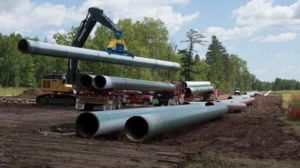MN Unions and Businesses Throw Clout Behind $2 Billion Pipeline
Kudos to the environmental activists plotting to turn the Enbridge 3 pipeline replacement project into the next Keystone XL or Dakota Access fiasco. They’ve managed to bring together two groups that more often oppose each other to consolidate their collective political influence behind approval of the $2 billion pipeline in the Star Tribune’s editorial pages.
In Minnesota we’re fortunate to have a well-advanced alternative, an entirely private infrastructure project that would put 6,500 Minnesotans to work over two years, with an economic impact of more than $2 billion for the state, including outstate areas that sorely need it.
We’re talking about Enbridge Energy’s 1,097-mile, Line 3 crude oil pipeline replacement from Alberta stretching southeast across central Minnesota from the North Dakota border near Hallock to a terminal in Superior, Wis.
The Minnesota Chamber of Commerce and Minnesota Building and Construction Trades Council joined forces to make the case for the vital Enbridge infrastructure and thousands of well-paying jobs to build it.
Pipelines are essential to the development and growth of our region’s economy. Even as vehicles transition to electricity, we will still be dependent on petroleum products well into the future. From the clothing we wear to the chemicals that are part of so many consumer products and keep thousands of manufacturers operating in our region — we need petroleum products for long-term personal and economic health.
Co-authors Harry Melander and Bill Blazar chided the Dayton Administration for politicizing a project that will bring a much-needed economic boost to several impoverished rural counties.
Contrary to recent testimony from the Minnesota Department of Commerce, the project is necessary and prudent. Last month, the American Petroleum Institute reported that total domestic petroleum deliveries, a measure of U.S. petroleum demand, showed the highest July demand since 2007. Enbridge says its project is the safest alternative for replacing the 50-year-old existing line that operates at approximately 50 percent capacity and faces increasing maintenance requirements.
Just as importantly, the project represents an economic lifeline for northern Minnesota families and their communities. A University of Minnesota Duluth study projects a total economic impact of over $2 billion along the pipeline’s route.
It should go without saying that pipeline construction jobs are among the best-paying gigs in the labor market — and these are desperately needed paychecks in the predominantly rural counties along the pipeline route. They’re needed as well in the outside communities that will supply skilled workers — as far south as the Twin Cities — who will spend millions on food, housing and other essentials in the small towns along the route.
As public meetings continue across Minnesota we hope the leaders of our state will pay close attention to what their constituents who support the statewide development of our economy and safe energy transportation have to say.
